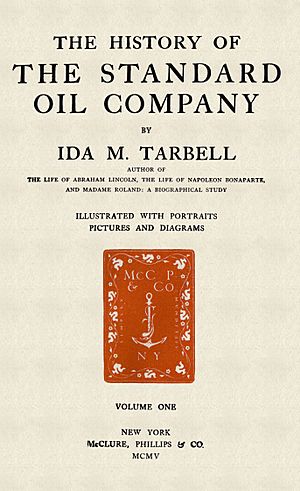The History of the Standard Oil Company facts for kids
 |
|
| Author | Ida M. Tarbell |
|---|---|
| Country | United States |
| Language | English |
| Subject | Standard Oil Company |
| Published | 1904 McClure, Phillips and Co. |
| Media type | |
| ISBN | 978-0-486-42821-5 |
| OCLC | 12591113 |
| LC Class | 04035331 |
The History of the Standard Oil Company is a famous book written in 1904 by a journalist named Ida Tarbell. It's a special kind of report called an exposé. This means it revealed hidden or unfair practices of the Standard Oil Company.
At the time, John D. Rockefeller ran Standard Oil. He was one of the richest people in American history. The book first appeared in parts in McClure's magazine. It's a great example of "muckraking." This term describes journalists who dig deep to expose problems or corruption. Tarbell's book inspired many other journalists. They started writing about "trusts," which were huge businesses trying to control entire industries. These companies often tried to create a monopoly, meaning they were the only ones selling a product or service.
The History of the Standard Oil Company helped lead to the breakup of Standard Oil. This happened in 1911. The Supreme Court of the United States decided the company was breaking the Sherman Antitrust Act. This law was made to stop monopolies and keep competition fair. Standard Oil was then split into 34 smaller companies. Interestingly, the value of Rockefeller's shares actually went up after the breakup.
The original book came in two hardcover volumes. A shorter paperback version was released later.
Contents
How the Book Started
Ida Tarbell's Early Life
Ida Tarbell's own childhood experiences greatly inspired her book. Her father, Franklin Tarbell, worked in the oil business. He saw firsthand the problems caused by Standard Oil. Ida described her community as being full of "hate, suspicion, and fear."
Investigating Standard Oil
Ida Tarbell saw how John D. Rockefeller and his partners took over smaller companies. This was called "horizontal integration." She started gathering information for her book early on. She felt both interested and upset by what she saw.
After finishing her education, Tarbell began working at McClure's Magazine. She wrote successful stories about historical figures there. Then, she turned her attention to John D. Rockefeller. She interviewed people who knew a lot about Standard Oil. This included Henry Huttleston Rogers, who was a colleague of her father and later worked with Rockefeller.
Eventually, Tarbell found important proof. She discovered that Standard Oil was unfairly controlling railroad prices. This made it hard for other oil companies to compete.
What Happened After the Book
Public Reaction and Impact
When Tarbell's 19-part story finished in McClure's, people were very upset. This public outcry helped speed up the breakup of Standard Oil in 1911. Journalists, politicians, and everyday citizens praised Ida Tarbell. She was a woman who worked outside the business world. She didn't have a lot of money or power. Yet, she made a huge difference.
Political cartoons from that time showed how her investigative journalism exposed Rockefeller's hidden plans.
How People Reviewed the Book
Many newspapers and journals reviewed The History of Standard Oil Company. They praised how calm and factual Tarbell's writing was. They also noted how it truly showed the bad effects of greed in business.
A 1904 review from The New York Times highlighted the book's fairness. It said Tarbell respected Rockefeller's achievements. But she was also critical of Standard Oil's unfair and possibly illegal business methods. The Economic Journal called her work "monumental." It said her facts were careful and her judgments were sensible.
Legacy of the Book
Even though Standard Oil became more valuable after it split up, Tarbell's book was very important. It showed the power of the press. It became a strong symbol of how journalists can expose wrongdoings. The History of the Standard Oil Company is still seen as a key example of modern investigative journalism.
In 1999, a group of journalism experts at New York University picked Tarbell's book. They called it the fifth best work of journalism in the United States in the 20th Century. Steve Weinberg, in his 2008 book, called it "arguably the greatest work of investigative journalism ever written."
However, not everyone agreed with Tarbell's view. In 2010, economist Thomas Sowell said Tarbell only picked certain facts for her book. He pointed out that Rockefeller's improvements actually made oil much cheaper. Sowell questioned if people would have been better off if oil had remained more expensive.
 | Ernest Everett Just |
 | Mary Jackson |
 | Emmett Chappelle |
 | Marie Maynard Daly |

